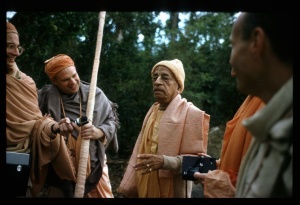SB 9.10.21: Difference between revisions
m (1 revision(s)) |
(Vanibot #0018 edit: make synonym terms in Sanskrit italic in SB - Vanisource) |
||
| Line 1: | Line 1: | ||
{{info | {{info | ||
|speaker= | |speaker=Śukadeva Gosvāmī | ||
|listener=King | |listener=King Parīkṣit | ||
}} | }} | ||
[[Category:Srimad-Bhagavatam - Canto 09 Chapter 10]] | |||
[[Category:Bhagavatam Verses Spoken by Sukadeva Gosvami - Vanisource|091021]] | |||
<div style="float:left">'''[[Srimad-Bhagavatam]] - [[SB 9|Ninth Canto]] - [[SB 9.10: The Pastimes of the Supreme Lord, Ramacandra|Chapter 10: The Pastimes of the Supreme Lord, Rāmacandra]]'''</div> | |||
<div style="float:right">[[File:Go-previous.png|link=SB 9.10.20]] '''[[SB 9.10.20]] - [[SB 9.10.22]]''' [[File:Go-next.png|link=SB 9.10.22]]</div> | |||
{{RandomImage}} | |||
==== TEXT 21 ==== | ==== TEXT 21 ==== | ||
<div | <div class="verse"> | ||
rakṣaḥ-patiḥ sva-bala-naṣṭim avekṣya ruṣṭa | :rakṣaḥ-patiḥ sva-bala-naṣṭim avekṣya ruṣṭa | ||
āruhya yānakam athābhisasāra rāmam | :āruhya yānakam athābhisasāra rāmam | ||
svaḥ-syandane dyumati mātalinopanīte | :svaḥ-syandane dyumati mātalinopanīte | ||
vibhrājamānam ahanan niśitaiḥ kṣurapraiḥ | :vibhrājamānam ahanan niśitaiḥ kṣurapraiḥ | ||
</div> | </div> | ||
| Line 17: | Line 22: | ||
==== SYNONYMS ==== | ==== SYNONYMS ==== | ||
<div | <div class="synonyms"> | ||
rakṣaḥ- | ''rakṣaḥ-patiḥ''—the leader of the Rākṣasas, Rāvaṇa; ''sva-bala-naṣṭim''—the destruction of his own soldiers; ''avekṣya''—after observing; ''ruṣṭaḥ''—became very angry; ''āruhya''—riding on; ''yānakam''—his beautiful airplane decorated with flowers; ''atha''—thereafter; ''abhisasāra''—proceeded toward; ''rāmam''—Lord Rāmacandra; ''svaḥ-syandane''—in the celestial chariot of Indra; ''dyumati''—glittering; ''mātalinā''—by Mātali, the chariot driver of Indra; ''upanīte''—having been brought; ''vibhrājamānam''—Lord Rāmacandra, as if brilliantly illuminating; ''ahanat''—Rāvaṇa struck him; ''niśitaiḥ''—very sharp; ''kṣurapraiḥ''—with arrows. | ||
</div> | </div> | ||
| Line 24: | Line 29: | ||
==== TRANSLATION ==== | ==== TRANSLATION ==== | ||
<div | <div class="translation"> | ||
Thereafter, when Rāvaṇa, the king of the Rākṣasas, observed that his soldiers had been lost, he was extremely angry. Thus he mounted his airplane, which was decorated with flowers, and proceeded toward Lord Rāmacandra, who sat on the effulgent chariot brought by Mātali, the chariot driver of Indra. Then Rāvaṇa struck Lord Rāmacandra with sharp arrows. | Thereafter, when Rāvaṇa, the king of the Rākṣasas, observed that his soldiers had been lost, he was extremely angry. Thus he mounted his airplane, which was decorated with flowers, and proceeded toward Lord Rāmacandra, who sat on the effulgent chariot brought by Mātali, the chariot driver of Indra. Then Rāvaṇa struck Lord Rāmacandra with sharp arrows. | ||
</div> | </div> | ||
__NOTOC__ | |||
<div style="float:right; clear:both;">[[File:Go-previous.png|link=SB 9.10.20]] '''[[SB 9.10.20]] - [[SB 9.10.22]]''' [[File:Go-next.png|link=SB 9.10.22]]</div> | |||
__NOTOC__ | |||
__NOEDITSECTION__ | |||
Revision as of 09:29, 1 December 2017

A.C. Bhaktivedanta Swami Prabhupada
TEXT 21
- rakṣaḥ-patiḥ sva-bala-naṣṭim avekṣya ruṣṭa
- āruhya yānakam athābhisasāra rāmam
- svaḥ-syandane dyumati mātalinopanīte
- vibhrājamānam ahanan niśitaiḥ kṣurapraiḥ
SYNONYMS
rakṣaḥ-patiḥ—the leader of the Rākṣasas, Rāvaṇa; sva-bala-naṣṭim—the destruction of his own soldiers; avekṣya—after observing; ruṣṭaḥ—became very angry; āruhya—riding on; yānakam—his beautiful airplane decorated with flowers; atha—thereafter; abhisasāra—proceeded toward; rāmam—Lord Rāmacandra; svaḥ-syandane—in the celestial chariot of Indra; dyumati—glittering; mātalinā—by Mātali, the chariot driver of Indra; upanīte—having been brought; vibhrājamānam—Lord Rāmacandra, as if brilliantly illuminating; ahanat—Rāvaṇa struck him; niśitaiḥ—very sharp; kṣurapraiḥ—with arrows.
TRANSLATION
Thereafter, when Rāvaṇa, the king of the Rākṣasas, observed that his soldiers had been lost, he was extremely angry. Thus he mounted his airplane, which was decorated with flowers, and proceeded toward Lord Rāmacandra, who sat on the effulgent chariot brought by Mātali, the chariot driver of Indra. Then Rāvaṇa struck Lord Rāmacandra with sharp arrows.